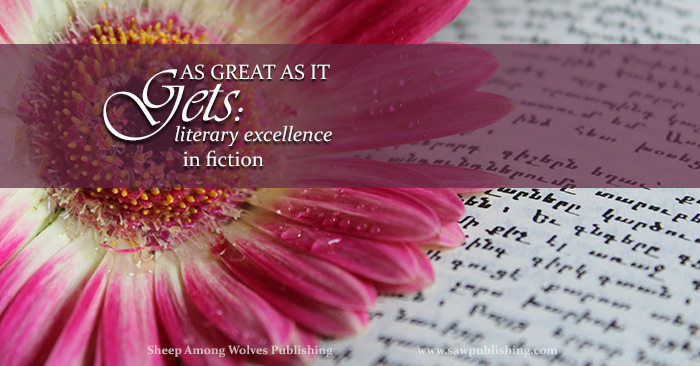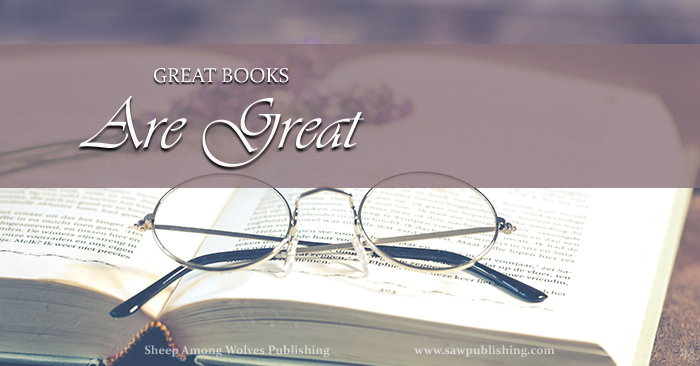As Great as it Gets: Literary Excellence in Fiction
 How much does literary excellence really matter?
How much does literary excellence really matter?
Probably (dare I suggest, somewhere about the fifty-page mark of a three-hundred-page church library loan?) we’ve all asked ourselves this question.
(Not that I’m trying to discriminate against church library books—but just to put a test case in your hands!)
If good books—books that uphold flawless spiritual merits—are so important, what does that say about great books—books of outstanding literary excellence? Are great books important? And if so, why?
Great Books Build our Standard of Literary Excellence
 Our standards for literature, just like our standards for most other things, are developed largely by exposure.
Our standards for literature, just like our standards for most other things, are developed largely by exposure.
My sisters and I laugh sometimes over the amount of stress we lavished as children on the historical adventure stories that we had read aloud to us. As an adult, the plot devices are so patently obvious—and as kids we thought them so unique and unpredictable that we lost sleep worrying whether the characters would get safely out of their predicaments!
It was all a question of exposure, really. The best book you have ever read in any genre tends, almost subconsciously, to inform your image of the best book possible in the given category. Ongoing exposure to great literature raises and informs a reader’s standard of literary excellence in the best and fullest way.
Great Books Inspire our Search for Literary Excellence
A natural outcome of reading great books is the desire to go on reading great books.
No one searches for a needle in a haystack until they have first become acquainted (at least by report, but usually by experience) with the existence and value of needles as a whole.
Great books are not always quick or easy to find, but even as we raise our standard of literary excellence by reading the great books we have access to, we are also strengthening our motivation in the quest for the great literature which we have yet to discover—maybe even the great literature which has yet to be written.
Nothing is so favourable to the growth of great books as an enthusiastic readership looking for literary excellence in whatever they read.
Great Books Impact our Impression of Good Books
If I tell you that “cyber bullying is wrong” you will probably agree with me. Unless you have the emotion of outside experiences, you will agree in a businesslike and dispassionate frame of mind—because my remark was embodied in a businesslike and dispassionate sentence.
If, on the other hand, I rephrase the concept and say “cyber bullying is a dishonourable, cowardly waste of golden opportunities” whether or not you appreciate my slightly archaic language, I feel fairly confident that you got more of an adrenalin rush than when you read my first sentence.
Great writing—writing of the highest literary excellence—is a powerful weapon in the battle for good writing—writing of pure and elevated spiritual excellence. It is a powerful tool in motivating and equipping readers to live for Christ’s kingdom.
As Great as it Gets: Seeking Literary Excellence in Fiction
Great fiction does powerful things.
Like all powerful instruments, it is capable of being used for good—or for evil.
We of today have the great privilege—as well as the great responsibility—of wielding this instrument of great books in our own generation. We have the potential to influence the way it continues to be wielded, down through the ages, until Christ returns.
Do you value literary excellence enough to wield it well? Are you willing to stand for good and great fiction, to God’s glory? Are you willing to start today?
For a more detailed look at a few attributes of high-quality literature, see our previous post:
You might also enjoy:

Spiritual excellence in fiction is something that we at SAW Publishing are passionate about. But why are these kinds of books valuable? Here’s a look at three answers.

Are you looking for well-written, Christ-centred literature to include in your homeschooling curriculum? SAW Publishing’s FREE collection of Christian poetry classics is a great place to start!

Do we have a double standard when it comes to poetry? Have you ever heard anybody answer “Yes!” to that question?” Especially as “Yes!” with a big, enthusiastic exclamation mark at the end?


I. love. This. YESSSSS!
Oh, I’m so glad!